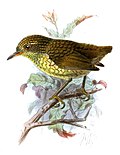Phlegopsis
| Phlegopsis | |
|---|---|

| |
| Black-spotted bare-eye (Phlegopsis nigromaculata) | |
| Scientific classification | |
| Domain: | Eukaryota |
| Kingdom: | Animalia |
| Phylum: | Chordata |
| Class: | Aves |
| Order: | Passeriformes |
| Family: | Thamnophilidae |
| Genus: | Phlegopsis Reichenbach, 1850 |
| Type species | |
| Myiothera nigromaculata[1] d'Orbigny & Lafresnaye, 1837
| |
Phlegopsis is a genus of insectivorous passerine birds in the antbird family, Thamnophilidae. They are known as "bare-eyes", which is a reference to a colourful bare patch of skin around their eyes. They are restricted to humid forest in the Amazon of South America. They are among the largest ant-followers in the family and are only rarely seen away from ant swarms.
Taxonomy
[edit]The pale-faced bare-eye, sometimes known as the pale-faced antbird, has often been placed in the monotypic genus Skutchia, but based on genetic evidence it should be placed in Phlegopsis,[2] and this treatment was adopted by the SACC in 2010.[3] Based on a single specimen a fourth species, the Argus bare-eye (P. barringeri) has been proposed, but it is a hybrid between P. erythroptera and P. nigromaculata.[4]
The genus contains three species:[5]
- Reddish-winged bare-eye (Phlegopsis erythroptera)
- Black-spotted bare-eye (Phlegopsis nigromaculata)
- Pale-faced bare-eye (Phlegopsis borbae)
References
[edit]- ^ "Thamnophilidae". aviansystematics.org. The Trust for Avian Systematics. Retrieved 2023-07-16.
- ^ Aleixo, A.; Burlamaqui, T.C.T.; Schneider, M.P.C.; Goncalves, E.C. (2009). "Molecular systematics and plumage evolution in the monotypic obligate army-ant-following genus Skutchia (Thamnophilidae)" (PDF). Condor. 111 (2): 382–387. doi:10.1525/cond.2009.080097. S2CID 86429198.
- ^ Brumfield, R.T. (April 2010). "Proposal (432): Merge Skutchia borbae into Phlegopsis (Thamnophilidae". South American Classification Committee of the American Ornithological Society. Retrieved 6 February 2018.
- ^ Graves, Garry R. (1992). "Diagnosis of a hybrid antbird (Phlegopsis nigromaculata X Phlegopsis erythroptera) and the rarity of hybridization among suboscines". Proceedings of the Biological Society of Washington. 105: 834–340. hdl:10088/16733.
- ^ Gill, Frank; Donsker, David, eds. (2018). "Antbirds". World Bird List Version 8.1. International Ornithologists' Union. Retrieved 4 February 2018.

